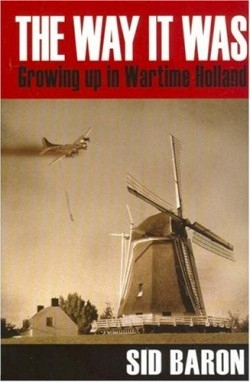
The Way it Was
Growing Up in Wartime Holland
“History is the ship carrying living memories to the future.”
—Stephen Spender
The problem with the art of the memoir is perception. Readers must decide if they are being shown a true representation of the past or a facsimile created by the passage of time that taints the memoirist’s observations with the jaded wisdom of life experience. Thus one never knows the truth and must take the memoirist’s words at face value even while questioning their validity, like James Frey’s discredited memoir, A Million Little Pieces.
Sid Baron’s memoir, The Way It Was: Growing Up in Wartime Holland, is in the same vein as such books as The Diary of Anne Frank (new revised version, The Diary of a Young Girl) and Corrie ten Boom’s The Hiding Place. Like the aforementioned memoirs, Baron paints a picture of a semi-idyllic time of simple and undisturbed innocence in contrast to the sheer immensity of the evils committed in the name of the “The Final Solution” in Nazi-occupied Europe.
Baron’ boyhood was a simple agrarian existence on the cusp of industrialization in rural Holland. Baron writes, “When I was seven years old, sitting at the kitchen table and drawing on a piece of paper with a pencil was a favorite activity of mine…I could stare out the window and watch the wind…I could lazily dream about all the things little boys dream about.”
The idea of daydreaming during Nazi occupation seems ludicrous and any semblances of child-like wonder must have been buried down deep in the heart of survival. Such trivialities as maintaining the family farm, shopping, and going to school became more of a need to keep up the appearance of an accepted norm. Remaining inconspicuous to nosy neighbors as well as the enemy weighed heavily in importance. Baron continued to try to be a child even while his parents were part of the Holland resistance. Thrust into an insane situation, he was guilty by association. His chores became surreal: Hiding an unregistered illegal radio, carrying a pistol and barely avoiding being searched, denying to a known Nazi sympathizer that an ally soldier and his family were living in his home, and dodging machine gun bullets. Baron writes, “My few remaining steps to the house were interrupted by the sound of screaming fighter plane engines…Instantly, I dropped face down on the ground, clasping my hands around the back of my head to protect myself. Empty heavy-caliber machine gun shells rained down from the sky all around me and on the ribbed aluminum roof covering the pump house.”
While reading Baron’s lyrical prose, one cannot help but think how lucky he was to have come out World War II unscathed and able to tell his story. Some sixty year later, in 2007 there are countries on our planet where children must deal with enemy occupation and the stench of degradation and death everyday. How lucky our children are not to have to experience ethnic cleansing and war zones in their front and back yards.
Sid Baron is a successful business entrepreneur, sought-after public speaker, and author of the novel, Dawning of A New Day.
Disclosure: This article is not an endorsement, but a review. The publisher of this book provided free copies of the book and paid a small fee to have their book reviewed by a professional reviewer. Foreword Reviews and Clarion Reviews make no guarantee that the publisher will receive a positive review. Foreword Magazine, Inc. is disclosing this in accordance with the Federal Trade Commission’s 16 CFR, Part 255.
